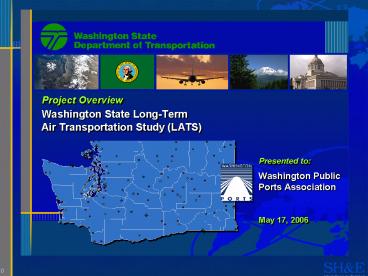For Screen Show Presentations Only - PowerPoint PPT Presentation
1 / 20
Title:
For Screen Show Presentations Only
Description:
10-year FAA study revealed need for new regional airport in southwest Washington ... Governor authorized Long-term Air Transportation Study (LATS) in 2005 to ... – PowerPoint PPT presentation
Number of Views:64
Avg rating:3.0/5.0
Title: For Screen Show Presentations Only
1
(No Transcript)
2
Is the State Prepared?
FAA FORECAST - 2030
3
Critical Issues
- Funding opportunities are tightening as fuel tax
revenues and federal budgets decline - FAA forecasts predict significant increases and
changes in aviation activity by 2030 - Washington lacks a statewide strategy to ensure
adequate aviation capacity to accommodate
predicted growth - Long-range planning is needed now to make smart,
targeted investments and to protect our aviation
system for the future
4
Statewide Growth
- WA population has doubled in the last 30 years
and an additional 2 million are expected by 2025 - Significant growth expected in regions
- Puget Sound 1 million increase
- SW Washington 270,000 increase
- Spokane Area 240,000 increase
- Tri-Cities Area 100,000 increase
- Historically, increases in population result in
increased aviation activity for business,
freight, emergency access, public safety and
recreation
5
Puget Sound
- Sea-Tac - may reach capacity by 2021
- Boeing Field operations expected to increase by
50 over next 20 years - Paine Field GA operations to increase by 80,000
in next 20 years
Puget Sound forecasts pop. increase of 1
million in 20 years
6
Southwest Washington
- 10-year FAA study revealed need for new regional
airport in southwest Washington - One of the regions public-use airports is
closing - Pearson Field operations constricted by
structures - PDX anticipates need for a 3rd parallel runway
after 2020
7
Spokane
- In 20 years
- Enplaned passengers will nearly double
- Even more dramatic increase expected for air
cargo - Demand for larger capacity aircraft i.e. regional
and business jets
8
Tri-Cites
- Forecasted increases in 2020
- Enplaned passengers 137,000
- Annual Operations 27,000
- General aviation expects most growth
9
Whats Been Done?
- WSDOT requires ALPs more than 30 will be
completed in 2005-2007 biennium - PSRC Flight Plan (1992)
- Build 3rd runway at Sea-Tac
- Develop major supplemental airports Paine
Field eliminated as preferred alternative - Major Supplemental Airport Feasibility Study
(1995) - Requested that state begin long range air study
10
Whats Next?
- Governor authorized Long-term Air Transportation
Study (LATS) in 2005 to determine current
capacity and what will be needed to meet future
demands to 2030. - Consists of three phases.
- WSDOT formed a technical committee to assist with
consultant selection, review and provide comment
on technical papers for Phases I and II, and
provide input on status reports - Federal Aviation Administration (FAA) has
authorized 900,000 for the study and
appropriations are expected on schedule in
January 2006
11
Three Phase Approach
12
Planning Council
- Governor will appoint ten member planning council
to include - WSDOT Aviation Director
- Director of CTED
- Member of Transportation Commission
- Two members of general public
- FAA technical expert
- Commercial airport operator
- Member of GMA hearings board
- WAMA representative
- Airline representative
13
System Plan Overview
Existing AirportConditions andCapacity
FutureFacilityCosts
Future Demand and Facility Requirements
Long-Term Prioritization and Investment
Public Information and Outreach
14
State System - 139 Public Use Airports
15
Phase I Planned Approach
Work Flow Diagram
Conduct RegionalCoordinationMeetings
- Prepare Existing
- Conditions Report
- Service levels
- Airside facilities
- Landside facilities
- Airfield capacity
- Landside capacity
- Airspace
Conduct Regional Coordination Meetings
- Collect Information
- Review existing reports
- Survey commercial service airports
- Survey select GA airports
- Collect Information
- Review existing reports
- Survey commercial service airports
- Survey select GA airports
- Collect Information
- Review existing reports
- Survey and Visit commercial service airports
- Survey GA airports
- Prepare System
- Capacity Reports
- Airspace analysis
- Physical capacities
- Potential demand
Technical Committee Review
16
Phase II Planned Approach
Identify/EvaluateKey Factors that May Affect
Future Air Travel
Develop Demand Forecasts
Determine Capacity Limit Timeframe At Commercial
Airports
Prepare Air Cargo Forecast
Perform High Speed Rail Evaluation
Update Airport Roles and Evaluation
Criteria
17
Phase II Planned Approach
Regional Meetings 2nd Set
Review and Evaluate Airport Capacity vs
Forecast Demand
Preliminary System Requirement Analysis
Present Findings to ATAC
Capital Improvement Summary
Prepare Final Report And Summary of
Findings
18
Phase III Planned Approach
Structure
Review Proposed Aviation Planning Council
Members Present Overview Of Phase I and II
Meet, Create Charter Collaboratively, Establish
Objectives and Overall Structure
Guide Council to Translate Study Purpose/ Goals
Into Vision for Washington
Identify Criteria for Determining Investment
Priorities for Council Review
19
Public Information and Outreach
- User friendly documentation and reporting
- Clear and accountable decision process
- Dedicated web page on WSDOT website
- Statewide media outreach
- Newsletters and e-mail updates
- Project team Communication Protocols to assure
consistent and clear communications - Leverage existing State Aviation forums and
organizations - Assure that new Aviation Planning Council, when
convened, is working from solid and balanced data
Team Philosophy Over Communicate Results and
Key Findings
20
Next Three Months
- Statewide Airport Inventory Survey (Web based)
Scheduled for Release May 30, 2006 - Regional Coordination Meetings and Commercial
Airport Visits Tentatively Schedule for June 15
30th - Preliminary Report of Progress to Date to State
Legislature- July 1, 2006 - For more information visit
- www.wsdot.wa.gov/aviation/ lats tab
- www.faa.gov/airports_airtraffic/airports/resources
/advisory_circulars/































